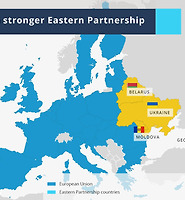휴먼노마드
[몰도바] 불편한 진실 1편 (인신매매) 본문
이 글은 https://www.endslaverynow.org/blog/articles/history-of-sex-trafficking-in-moldova 에서 발췌하여 번역한 것입니다.
Moldova is a small country surrounded by Romania and Ukraine. This former Soviet republic was known for its agricultural production, as the breadbasket of the USSR. Today, Moldova is regarded as the poorest country in Europe. Moldova is primarily a source country for victims of human trafficking, who are frequently forced to become sex workers in the Middle East.
몰도바는 루마니아와 우크라이나에 둘러싸인 작은 나라이다. 이전 소비에트공화국에는 소련연방의 곡창지대로써 그들의 농업생산품이 알려져 있다. 오늘날, 몰도바는 유럽에서 가장 가난한 나라로 여겨지고 있다. 몰도바는 주로 중동에서 빈번히 성노동자가 되기를 강요당하는 인신매매희생자의 공급처이다.
A History of Occupation and Slave Trade 점령과 노예무역의 역사
The region that is currently the Republic of Moldova has had a tumultuous history. For centuries, Moldova has experienced constant invasion and occupation by the Romans, Huns, Tatars, Ottomans, Mongols, Turks and Hungarians to name a few. Throughout hundreds of years of changing rule, human trafficking was regular practice. Captives from this region were carted to far off lands in Europe and the Middle East, bought and sold as sex and labor slaves. Girls from Eastern Europe have been coveted for their beauty and sold to Turkey in large-scale sex trades since the early 1800s. Moldova spent its more recent history controlled by neighboring Russia, and later, the Union of Soviet Socialist Republics (USSR). Until it declared independence in 1991, shifting identity and oppression have characterized Moldovan history and culture.
몰도바 공화국은 격동의 역사를 가지고 있다. 수세기 동안, 몰도바는 로마인, 훈족, 타타르족, 오스만, 몽골, 터키 및 헝가리에 의해 끊임없는 침략과 점렴을 경험하였다. 수백년에 걸친 변화하는 통치에서 인신매매는 정기적인 관행이 되었다. 이 지역의 포로들은 유럽과 중동의 멀리 떨어져있는 곳으로 운반되어 성노예나 강제노동자로 팔렸다. 동유럽의 소녀들은 1800년대 초반부터 대규모의 섹스무역에서 그녀들의 미모를 탐한 터키로 팔리게 된다. 몰도바는 그들의 최근 역사를 이웃한 러시아와, 나중에 소련연방의 지배되는 것에 보냈다. 1991년 독립을 선언하기 전까지는 정체성의 변화와 억압은 몰도바의 역사와 문화를 특징지게 된다.
Trafficking in the USSR 소련연방시절의 인신매매
During the era of the USSR, human trafficking by crime groups was low. However, human trafficking occurred on a massive scale at the hands of the state. In the 1940s and 1950s, more than 250,000 Moldovans were deported to labor camps in Siberia. The state simultaneously denied the existence of prostitution in the USSR and supported it. Prostitutes were granted special “yellow cards,” essentially a license to practice. Prostitution and sex slavery proliferated behind the Iron Curtain. Towards the end years of the USSR, prostitution and other deviant activities moved into the hands of large, organized crime groups. As the USSR neared social and economic collapse in its final years, human trafficking became an increasingly profitable enterprise. Widespread corruption did little to curb the rise in sexual exploitation of women from the Eastern Bloc.
소련연방시절동안 범죄집단에 의한 인신매매는 낮아졌지만, 국가의 손에 의해 엄청난 규모의 인신매매가 발생했다. 1940년대와 1950년대에 25만명이 넘는 몰도바 사람들이 시베리아의 노동수용소로 강제추방되었으며 국가는 소련연방에서 자행되는 매춘의 존재를 부정하는 동시에 그것을 지원했다. 매춘 여성들은 특별한 "옐로 카드"를 부여 받았다. 매춘과 성노예는 철의 장막 뒤에서 빠르게 확산되었다. 소련연방의 종말을 맞아 성매매 및 다른 비정상적인 움직임은 거대하고, 조직된 범죄집단의 손에 넘어가게 된다. 소련연방이 사회적, 경제적으로 붕괴됨에 따라 인신매매는 점진적인 수익을 창출하는 사업이 되었다. 광범위한 부패는 동구권 여성의 성착취에 대한 증가를 억제하는 데는 별로 도움이되지 못했다.
Post-Soviet Conditions Leads to Desperation 소비에트의 조건이 절망을 이끌다.
After the collapse of the Soviet Union, hundreds of thousands of Moldovans were unemployed and desperate, making them vulnerable to exploitation. Many social programs that benefitted women were dismantled. The economic situation became precarious, and deep impoverishment hit the rural areas of Moldova. Political transition benefited the development of organized crime networks that were able to take advantage of the instability of the region. Trafficking in human beings was on the rise as crime groups capitalized on poverty, corruption and the disadvantaged position of women in society.
소련의 붕괴이후 수십만명의 몰도바인들이 실업과 절망에 빠졌고, 착취에 취약했다. 여성를 돕는 많은 사회프로그램이 해체되었다. 경제적 상황이 불안정해지고 몰도바의 농촌 지역에 심각한 빈곤이 발생하였으며, 정치적 전환은 이 지역의 불안정성을 이용할 수 있는 조직적 범죄네트워크의 발전에 기여했다. 범죄집단이 빈곤, 부패 및 사회에서 여성의 불우한 위치를 이용하면서 인신 매매가 급증하게 되었다.
As human trafficking flourished, the state did little to protect its citizens. Corruption dominated society, and officials were easily paid off to look the other way, or even support trafficking activities. Orphanages became recruitment factories where girls in the most vulnerable positions in society were handed over to traffickers as they aged out of the system. By the mid-2000s, there was rampant corruption among senior government officials, police, boarder guards and judges (including the deputy director of the Center to Combat Trafficking in Persons) who were complicit in human trafficking. The very people who were supposed to be protecting Moldovans were using their power for personal gain in the recruitment, transport and exploitation of their own citizens. The government was slow to react, failing to investigate and prosecute these trafficking rings. Legislation has been slow to evolve, allowing recruiters to act with impunity.
인신매매가 성행하면서 국가는 국민을 보호하지 못했으며 부패가 사회를 지배했고 공무원은 다른 방법을 찾거나 심지어 인신매매 활동을 지원하면서 쉽게 돈을 벌었다. 고아원은 모집책이 되었으며, 사회에서 가장 취약한 위치의 소녀들이 제도에서 벗어나는 나이에 인신매매범에게 넘겨졌다. 2000년대 중반경 인신매매에 가담한 고위 공무원, 경찰, 국경경비대원 및 판사 (인신매매 근절센터 차장을 포함하여) 사이에 만연한 부패가 발생하였고 몰도바인들을 보호해야했던 바로 그 사람들은 자신의 시민들을 모집, 수송 및 착취하는데 있어 개인적 이익을 위해 자신들의 힘을 사용하고 있었다. 정부의 느린 반응은 이러한 인신매매의 고리를 조사하고 기소하는 것에 실패하게 된다. 법률제정은 입법화가 느려 모집책을 처벌없이 행동하도록 허락하였다.
Today, the average monthly salary in Moldova is only 230 USD. Few opportunities exist within the country, which has led to mass migration. More than a quarter of Moldova’s small population of four million live abroad, searching for better economic opportunities. Moldovans are desperate to get out, hopeful that they will find a more prosperous life elsewhere. This combination of desperation and hope leaves many young women susceptible to the false promises of recruiters who offer opportunities too good to be true in Europe and the Middle East.
오늘날 몰도바의 평균 월급은 230 달러에 불과하다. 국내에서는 기회가 거의 없기 때문에 대규모 이주가 발생하였고 400만명의 몰도바인구의 4 분의 1이상이 보다 좋은 경제적 기회를 찾기 위해 해외에 살고 있다. 몰도바인들은 필사적으로 나갈려고 하고 다른 곳에서 번영하는 삶을 찾을 수 있기를 희망하고 있다. 이러한 절망과 희망의 결합은 많은 젊은 여성들이 유럽과 중동에서 너무 좋아 진실일 수없는 기회를 제공하겠다는 모집책들의 거짓 약속에 취약하게 만든다.
Ads: Flyers posted in front of an abandoned construction site advertise cheap visas and job opportunities abroad. ©Kelsey Hoie Ferrell
버려진 건설현장앞에는 저렴한 비자와 해외로의 취업알선을 광고하는 전단지가 붙어있다.
Sex Trafficking in Moldova Today 오늘날의 몰도바에서의 성매매
It’s estimated that 1 in every 100 has been trafficked to date. Trafficking occurs both within the borders of Moldova and abroad, with the majority of victims being exploited in Russia, Turkey, Italy, Cyprus and the United Arab Emirates. Moldovan victims have been identified in more than 40 countries. Sex trafficking dominates the trade, but labor trafficking and forced begging are also common practice.
일별로 100명중 1명꼴로 인신매매되고 있다고 추정된다. 인신매매는 몰도바 국경과 해외에서 자행되며 대다수의 희생자는 러시아, 터키, 이탈리아, 키프로스와 아랍에미레이트에서 착취당하고 있다. 몰도바 희생자는 40여 국가이상에서 확인되었으며 성매매가 무역의 대다수를 차지하지만, 노동밀매와 강제구걸 또한 일반적인 관행으로 자리잡고 있다.
Many factors contribute to the proliferation of sex trafficking in Moldova. Today, almost all trafficking victims from Moldova leave on their own free will but don’t know the type of work they will be involved in. Eager to leave the country among the mass migration phenomenon, young women are open to greater risks; hopefulness makes them naïve to the dangers of trafficking. The prevalence of domestic violence in Moldovan culture is another motivating factor for women to take offers for work abroad in order to escape their abusers. 90% of victims of sexual exploitation from Moldova report that they had experienced violence at home prior to being trafficked. Traffickers can easily manipulate them given their desperation, often deceiving girls with the promise of love and prosperity in foreign lands. In the unlikely event that Moldovan victims escape and are repatriated, the risk of repeat trafficking is very high. Lack of opportunity and social support, stigmatization and severe poverty drives these women to again rally hope for prosperity anywhere else, even when they have experienced the risks firsthand.
많은 요인들이 몰도바에서 성매매의 확산에 기여하고 있다. 오늘날 거의 모든 인신매매 희생자들은 자신의 자유의지로 몰도바를 떠났지만, 그들이 참여할 일의 종류에 대해서 알지 못했다. 대규모 이주현상에 따라 국가를 떠나려는 열망은 젊은 여성을 보다 큰 위험에 노출시켰으며 희망은 그들을 인신매매의 위험에 순진하게 만든다. 몰도바의 문화에서 가정폭력의 확산은 여성이 학대를 피하기 위해 해외 취업을 제안받는 또 하나의 동기 부여 요소이다. 몰도바의 성착취 피해자의 90 %는 인신 매매되기 전에 집에서 폭력을 경험했다고 보고하고 있다. 인신매매업자들은 절망에 빠진 그들을 조종하여 외국에서 사랑과 번영에 대한 약속으로 소녀들을 속인다. 드물지만 몰도바 희생자가 탈출하여 본국으로 송환될 경우 반복적인 인신 매매의 위험이 매우 높다. 기회와 사회적 지원부족, 낙인찍기, 심각한 가난 등으로 인해 여성들은 위험을 직접 경험한 경우라 할지라도 또다시 다른 곳에서는 번영을 위한 희망으로 내몰기 때문이다.
Moldova is making strides at curbing human trafficking, but progress is slow. A crackdown on false study abroad and work-to-travel programs has limited one major recruitment method, though social media appears to have taken its place. National efforts are in place to educate communities on the risks of trafficking and the protection of victims upon repatriation. Traffickers are rarely prosecuted, and the convictions rarely result in prison time, so the risk remains low for networks of traffickers operating in Moldova. Further, Moldova is in a very precarious political situation, with an unstable government teetering between the east and the west, driving even more young people to seek jobs abroad.
몰도바는 인신매매를 억제하는데 진전을 이루고 있지만 진전은 느리다. 소셜미디어가 자리를 잡았음에도 불구하고 해외로의 거짓연수와 직업훈련에 대한 집중단속은 주된 모집수단밖에 제한하지 못하고 있다. 인신매매의 위험과 본국 송환시 희생자 보호에 대한 지역 사회의 교육 노력은 국가 차원에서 추진되고 있다. 하지만 인신매매는 거의 기소되지 않으며, 유죄판결은 금고형이 없기에 몰도바에서 영업하는 인신매매 조직망의 위험은 여전히 낮습니다. 더욱이 몰도바는 동부와 서부사이에서 비틀거리는 위태로운 정치상황에 처해 있으며, 더 많은 젊은이들을 해외로 직업을 구하는 것으로 내몰고 있다.
이 글은 다음과 같은 주제와 연결되어 있습니다.
[몰도바] 불편한 진실 3편 (재외국민의 송금으로 유지되는 나라)
도움이 되셨다면 바쁘시더라도 1초만 시간을 내주셔서 공감 및 댓글을 달아주시겠어요?
여러분의 공감과 댓글은 글쓴이에게 큰 힘이 된답니다.
'세계의 이모저모 > 몰도바' 카테고리의 다른 글
| [몰도바] 불편한 진실 3편 (재외국민의 송금으로 유지되는 나라) (0) | 2018.07.30 |
|---|---|
| [몰도바] 불편한 진실 2편 (인구감소) (0) | 2018.07.28 |
| [몰도바] 현실 6편 (최대의 스캔들 - 은행사기스캔들) (0) | 2018.07.25 |
| [몰도바] 현실 5편 (러시아의 압박과 EU 가입) (0) | 2018.07.25 |
| [몰도바] 현실 4편 (대통령의 부재) (0) | 2018.07.25 |





